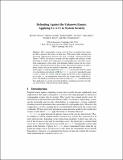| dc.contributor.author | Bowers, Kevin D. | |
| dc.contributor.author | van Dijk, Marten | |
| dc.contributor.author | Griffin, Robert | |
| dc.contributor.author | Juels, Ari | |
| dc.contributor.author | Oprea, Alina | |
| dc.contributor.author | Rivest, Ronald L. | |
| dc.contributor.author | Triandopoulos, Nikos | |
| dc.date.accessioned | 2014-10-07T17:58:55Z | |
| dc.date.available | 2014-10-07T17:58:55Z | |
| dc.date.issued | 2012 | |
| dc.identifier.isbn | 978-3-642-34265-3 | |
| dc.identifier.isbn | 978-3-642-34266-0 | |
| dc.identifier.issn | 0302-9743 | |
| dc.identifier.issn | 1611-3349 | |
| dc.identifier.uri | http://hdl.handle.net/1721.1/90591 | |
| dc.description.abstract | Most cryptographic systems carry the basic assumption that entities are able to preserve the secrecy of their keys. With attacks today showing ever increasing sophistication, however, this tenet is eroding. “Advanced Persistent Threats” (APTs), for instance, leverage zero-day exploits and extensive system knowledge to achieve full compromise of cryptographic keys and other secrets. Such compromise is often silent, with defenders failing to detect the loss of private keys critical to protection of their systems. The growing virulence of today’s threats clearly calls for new models of defenders’ goals and abilities.
In this paper, we explore applications of FlipIt, a novel game-theoretic model of system defense introduced in [14]. In FlipIt, an attacker periodically gains complete control of a system, with the unique feature that system compromises are stealthy, i.e., not immediately detected by the system owner, called the defender. We distill out several lessons from our study of FlipIt and demonstrate their application to several real-world problems, including password reset policies, key rotation, VM refresh and cloud auditing. | en_US |
| dc.language.iso | en_US | |
| dc.publisher | Springer Science+Business Media | en_US |
| dc.relation.isversionof | http://dx.doi.org/10.1007/978-3-642-34266-0_15 | en_US |
| dc.rights | Creative Commons Attribution-Noncommercial-Share Alike | en_US |
| dc.rights.uri | http://creativecommons.org/licenses/by-nc-sa/4.0/ | en_US |
| dc.source | MIT web domain | en_US |
| dc.title | Defending against the Unknown Enemy: Applying FlipIt to System Security | en_US |
| dc.type | Article | en_US |
| dc.identifier.citation | Bowers, Kevin D., Marten van Dijk, Robert Griffin, Ari Juels, Alina Oprea, Ronald L. Rivest, and Nikos Triandopoulos. “Defending Against the Unknown Enemy: Applying FlipIt to System Security.” Lecture Notes in Computer Science (2012): 248–263. | en_US |
| dc.contributor.department | Massachusetts Institute of Technology. Department of Electrical Engineering and Computer Science | en_US |
| dc.contributor.mitauthor | Rivest, Ronald L. | en_US |
| dc.relation.journal | Decision and Game Theory for Security | en_US |
| dc.eprint.version | Author's final manuscript | en_US |
| dc.type.uri | http://purl.org/eprint/type/ConferencePaper | en_US |
| eprint.status | http://purl.org/eprint/status/NonPeerReviewed | en_US |
| dspace.orderedauthors | Bowers, Kevin D.; van Dijk, Marten; Griffin, Robert; Juels, Ari; Oprea, Alina; Rivest, Ronald L.; Triandopoulos, Nikos | en_US |
| dc.identifier.orcid | https://orcid.org/0000-0002-7105-3690 | |
| mit.license | OPEN_ACCESS_POLICY | en_US |
| mit.metadata.status | Complete | |
